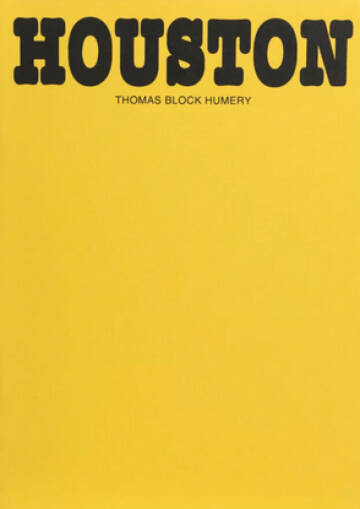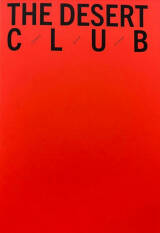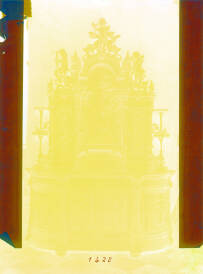Houston
by Thomas Block Humery
Photographs: Thomas Block Humery
Publisher: Alberto Art Books
64 pages
Year: October 2023
ISBN: 979-10-415-2589-8
Price: 35 €
Comments: Traditional offset printing with stapled binding. 21 × 29.7 cm (8.2 × 11.7 in). Printed in the EU. Language: English
“Houston” is not like any other book. Through the unique approach of autobiography, it invites us to explore, or imagine, the lesser-known of the major American metropolises. Compared to Los Angeles, New York, Miami, or Chicago, this Texan city has nothing of the postcard-perfect image. It may even be the opposite with its sprawling neighborhoods, highways that divide, or dare I say, cleave it, and its downtown area sweltering in the summer heat. Nevertheless, it is here that Thomas Block Humery invites us to conceive the city beyond urban, socio-economic, or cultural considerations, emphasizing the intimate dimension as a dynamic of knowledge. He perceives the city primarily as a place of self-projection validated by love, ambition, self-fulfillment, aesthetic comfort, and other hard-to-quantify aspirations.
In this perspective, the city is closely tied to feelings and emotions. With this proposition, the author transcends human geography’s descriptions consisting of demographic curves, economic statistics, or labor participation rates, retaining only the individual perspective shaped by emotions, adaptation, sharing, potential connections, and ever-changing visions influenced by contingency, delicacy, and the fragility of experience. The urban space unfolds through the dynamics of encounters, acting as a catalyst and an accelerator. Houston becomes the stage for an interaction where understanding of space goes hand in hand with the deepening of relationships.
The author revisits this specific knowledge a decade after the experience, reflecting on entrenched habits and forged bonds. Houston serves as a backdrop where real scenes played out, a backdrop that has changed, transformed by the inherent and specific forces of American cities for which a decade is a significant fraction of time. The city and its visitor reunite like two lovers who struggle to communicate. They say that criminals often return to the scene of their crime. What about someone who revisits the scenes of a past story?
The project raises the question: can this be conveyed through images? The answer is ambiguous, with both yes and no, because images, despite their limitations, can convey presence and absence, dreams and reality, the past, and sometimes the precariousness of the present. Thomas Block Humery playfully turns the city of Houston into a labyrinth, fragmented, geometrically abstract, and perhaps even chimerical, as if trying to piece together one fragment of life with another.
The book is replete with poetry and depth, featuring a photographer who sees metaphors more than reality. The project evolves into autofiction, and the response it offers takes the form of an artwork, touching on long-distance relationships, advertisements diverted from a golden age, building facades that act as screens, the passage of time, memories of “Paris, Texas,” local flora, cameras, and blank negatives. The city becomes a utopia with returning memories and emerging futures.
The project holds a particular place today, as many of us are tempted to live “elsewhere,” where a new form of nomadism is emerging in changing lifestyles. The experience here reveals a phenomenon of fragmentation, where life is no longer a simple straight line but a succession of moments, where rooting oneself seems to occur in various corners of the globe, in a kind of atomization of destinies caught in a multitude of potentialities. Thomas Block Humery does not pass judgment on the moral of the story. He embraces hopes and failures, regarding them as the ferment of a life that he prefers to be more romantic than entirely controlled.
The description of “Houston” would not be complete without mentioning the author’s text, which is part of the project, a confessional text that contextualizes the image corpus and gradually immerses the reader into a secret sphere where everyone can find a piece of themselves.
More books by Thomas Block Humery
more books tagged »autobiography« | >> see all
-
Self & Others - Portraits as Autobiography (review copy)
by Aline Smithson
Euro 55 44.00 -
Dublin (last copy)
by Krass Clement
sold out
more books tagged »visual poetry« | >> see all
-
These Earthly Shores (signed)
by Daphne Kotsiani
Euro 56 -
Traces et Métamorphoses (last copy)
by Gil Rigoulet
Euro 255 -
Langs Vinden (signed)
by Krass Clement
Euro 770 -
Small Things in Silence
by Masao Yamamoto
Euro 57 -
Drifting Stones (book + vinyl - signed - last copy)
by Paul Cupido
Euro 250 -
Dame Gulizar and Other Love Stories
by Rebecca Topakian
Euro 68.50
more books tagged »French« | >> see all
-
Images a la Sauvette
by Henri Cartier-Bresson
Euro 3300 -
so it goes, so it goes, so it goes, so it goes
by Miho Kajioka
Euro 79.50 -
Glanage
by Naohiro Ninomiya
Euro 118 -
Champs d'amour
by Vincent Gouriou
Euro 65 -
Des oiseaux (English version)
by Nathalie Baetens
Euro 44 -
Les Femmes
by Jacques Henri Lartigue
Euro 88
more books tagged »american« | >> see all
-
The Long Shadow
by Odette England
Euro 44 -
Know Me for the First Time (signed)
by Siri Kaur
Euro 125 -
From the Missouri West
by Robert Adams
Euro 137.50 -
I’ll let you be in my dreams if I can be in yours (signed)
by Carolyn Drake, Andres Gonzalez
Euro 66 -
Advice for Young Artists (signed)
by Alec Soth
Euro 60.50 -
David Armstrong Contacts
by David Armstrong
Euro 71.50
more books tagged »USA« | >> see all
-
The Americans
by Robert Frank
Euro 53 -
Half a Chisel to the Earth
by Tommy Nease
Euro 84 -
Studio Notes - My Time with Cy (book + print)
by Rob McDonald
Euro 165 -
Ballet
by Alexey Brodovitch
Euro 209 -
Call Me Lola: In Search of Mother
by Loli Kantor
Euro 53 -
This Kind of Face (signed)
by Siri Kaur
Euro 125
Random selection from the Virtual bookshelf josefchladek.com
Houston
by Thomas Block Humery
Photographs: Thomas Block Humery
Publisher: Alberto Art Books
64 pages
Year: October 2023
ISBN: 979-10-415-2589-8
Price: 35 €
Comments: Traditional offset printing with stapled binding. 21 × 29.7 cm (8.2 × 11.7 in). Printed in the EU. Language: English
“Houston” is not like any other book. Through the unique approach of autobiography, it invites us to explore, or imagine, the lesser-known of the major American metropolises. Compared to Los Angeles, New York, Miami, or Chicago, this Texan city has nothing of the postcard-perfect image. It may even be the opposite with its sprawling neighborhoods, highways that divide, or dare I say, cleave it, and its downtown area sweltering in the summer heat. Nevertheless, it is here that Thomas Block Humery invites us to conceive the city beyond urban, socio-economic, or cultural considerations, emphasizing the intimate dimension as a dynamic of knowledge. He perceives the city primarily as a place of self-projection validated by love, ambition, self-fulfillment, aesthetic comfort, and other hard-to-quantify aspirations.
In this perspective, the city is closely tied to feelings and emotions. With this proposition, the author transcends human geography’s descriptions consisting of demographic curves, economic statistics, or labor participation rates, retaining only the individual perspective shaped by emotions, adaptation, sharing, potential connections, and ever-changing visions influenced by contingency, delicacy, and the fragility of experience. The urban space unfolds through the dynamics of encounters, acting as a catalyst and an accelerator. Houston becomes the stage for an interaction where understanding of space goes hand in hand with the deepening of relationships.
The author revisits this specific knowledge a decade after the experience, reflecting on entrenched habits and forged bonds. Houston serves as a backdrop where real scenes played out, a backdrop that has changed, transformed by the inherent and specific forces of American cities for which a decade is a significant fraction of time. The city and its visitor reunite like two lovers who struggle to communicate. They say that criminals often return to the scene of their crime. What about someone who revisits the scenes of a past story?
The project raises the question: can this be conveyed through images? The answer is ambiguous, with both yes and no, because images, despite their limitations, can convey presence and absence, dreams and reality, the past, and sometimes the precariousness of the present. Thomas Block Humery playfully turns the city of Houston into a labyrinth, fragmented, geometrically abstract, and perhaps even chimerical, as if trying to piece together one fragment of life with another.
The book is replete with poetry and depth, featuring a photographer who sees metaphors more than reality. The project evolves into autofiction, and the response it offers takes the form of an artwork, touching on long-distance relationships, advertisements diverted from a golden age, building facades that act as screens, the passage of time, memories of “Paris, Texas,” local flora, cameras, and blank negatives. The city becomes a utopia with returning memories and emerging futures.
The project holds a particular place today, as many of us are tempted to live “elsewhere,” where a new form of nomadism is emerging in changing lifestyles. The experience here reveals a phenomenon of fragmentation, where life is no longer a simple straight line but a succession of moments, where rooting oneself seems to occur in various corners of the globe, in a kind of atomization of destinies caught in a multitude of potentialities. Thomas Block Humery does not pass judgment on the moral of the story. He embraces hopes and failures, regarding them as the ferment of a life that he prefers to be more romantic than entirely controlled.
The description of “Houston” would not be complete without mentioning the author’s text, which is part of the project, a confessional text that contextualizes the image corpus and gradually immerses the reader into a secret sphere where everyone can find a piece of themselves.
More books by Thomas Block Humery
more books tagged »autobiography« | >> see all
-
Self & Others - Portraits as Autobiography (review copy)
by Aline Smithson
Euro 55 44.00 -
Dublin (last copy)
by Krass Clement
sold out
more books tagged »visual poetry« | >> see all
-
These Earthly Shores (signed)
by Daphne Kotsiani
Euro 56 -
Traces et Métamorphoses (last copy)
by Gil Rigoulet
Euro 255 -
Langs Vinden (signed)
by Krass Clement
Euro 770 -
Small Things in Silence
by Masao Yamamoto
Euro 57 -
Drifting Stones (book + vinyl - signed - last copy)
by Paul Cupido
Euro 250 -
Dame Gulizar and Other Love Stories
by Rebecca Topakian
Euro 68.50
more books tagged »French« | >> see all
-
Images a la Sauvette
by Henri Cartier-Bresson
Euro 3300 -
so it goes, so it goes, so it goes, so it goes
by Miho Kajioka
Euro 79.50 -
Glanage
by Naohiro Ninomiya
Euro 118 -
Champs d'amour
by Vincent Gouriou
Euro 65 -
Des oiseaux (English version)
by Nathalie Baetens
Euro 44 -
Les Femmes
by Jacques Henri Lartigue
Euro 88
more books tagged »american« | >> see all
-
The Long Shadow
by Odette England
Euro 44 -
Know Me for the First Time (signed)
by Siri Kaur
Euro 125 -
From the Missouri West
by Robert Adams
Euro 137.50 -
I’ll let you be in my dreams if I can be in yours (signed)
by Carolyn Drake, Andres Gonzalez
Euro 66 -
Advice for Young Artists (signed)
by Alec Soth
Euro 60.50 -
David Armstrong Contacts
by David Armstrong
Euro 71.50
more books tagged »USA« | >> see all
-
The Americans
by Robert Frank
Euro 53 -
Half a Chisel to the Earth
by Tommy Nease
Euro 84 -
Studio Notes - My Time with Cy (book + print)
by Rob McDonald
Euro 165 -
Ballet
by Alexey Brodovitch
Euro 209 -
Call Me Lola: In Search of Mother
by Loli Kantor
Euro 53 -
This Kind of Face (signed)
by Siri Kaur
Euro 125
Random selection from the Virtual bookshelf josefchladek.com
Houston
by Thomas Block Humery
Photographs: Thomas Block Humery
Publisher: Alberto Art Books
64 pages
Year: October 2023
ISBN: 979-10-415-2589-8
Price: 35 €
Comments: Traditional offset printing with stapled binding. 21 × 29.7 cm (8.2 × 11.7 in). Printed in the EU. Language: English
“Houston” is not like any other book. Through the unique approach of autobiography, it invites us to explore, or imagine, the lesser-known of the major American metropolises. Compared to Los Angeles, New York, Miami, or Chicago, this Texan city has nothing of the postcard-perfect image. It may even be the opposite with its sprawling neighborhoods, highways that divide, or dare I say, cleave it, and its downtown area sweltering in the summer heat. Nevertheless, it is here that Thomas Block Humery invites us to conceive the city beyond urban, socio-economic, or cultural considerations, emphasizing the intimate dimension as a dynamic of knowledge. He perceives the city primarily as a place of self-projection validated by love, ambition, self-fulfillment, aesthetic comfort, and other hard-to-quantify aspirations.
In this perspective, the city is closely tied to feelings and emotions. With this proposition, the author transcends human geography’s descriptions consisting of demographic curves, economic statistics, or labor participation rates, retaining only the individual perspective shaped by emotions, adaptation, sharing, potential connections, and ever-changing visions influenced by contingency, delicacy, and the fragility of experience. The urban space unfolds through the dynamics of encounters, acting as a catalyst and an accelerator. Houston becomes the stage for an interaction where understanding of space goes hand in hand with the deepening of relationships.
The author revisits this specific knowledge a decade after the experience, reflecting on entrenched habits and forged bonds. Houston serves as a backdrop where real scenes played out, a backdrop that has changed, transformed by the inherent and specific forces of American cities for which a decade is a significant fraction of time. The city and its visitor reunite like two lovers who struggle to communicate. They say that criminals often return to the scene of their crime. What about someone who revisits the scenes of a past story?
The project raises the question: can this be conveyed through images? The answer is ambiguous, with both yes and no, because images, despite their limitations, can convey presence and absence, dreams and reality, the past, and sometimes the precariousness of the present. Thomas Block Humery playfully turns the city of Houston into a labyrinth, fragmented, geometrically abstract, and perhaps even chimerical, as if trying to piece together one fragment of life with another.
The book is replete with poetry and depth, featuring a photographer who sees metaphors more than reality. The project evolves into autofiction, and the response it offers takes the form of an artwork, touching on long-distance relationships, advertisements diverted from a golden age, building facades that act as screens, the passage of time, memories of “Paris, Texas,” local flora, cameras, and blank negatives. The city becomes a utopia with returning memories and emerging futures.
The project holds a particular place today, as many of us are tempted to live “elsewhere,” where a new form of nomadism is emerging in changing lifestyles. The experience here reveals a phenomenon of fragmentation, where life is no longer a simple straight line but a succession of moments, where rooting oneself seems to occur in various corners of the globe, in a kind of atomization of destinies caught in a multitude of potentialities. Thomas Block Humery does not pass judgment on the moral of the story. He embraces hopes and failures, regarding them as the ferment of a life that he prefers to be more romantic than entirely controlled.
The description of “Houston” would not be complete without mentioning the author’s text, which is part of the project, a confessional text that contextualizes the image corpus and gradually immerses the reader into a secret sphere where everyone can find a piece of themselves.
More books by Thomas Block Humery
more books tagged »autobiography« | >> see all
-
Self & Others - Portraits as Autobiography (review copy)
by Aline Smithson
Euro 55 44.00 -
Dublin (last copy)
by Krass Clement
sold out
more books tagged »visual poetry« | >> see all
-
These Earthly Shores (signed)
by Daphne Kotsiani
Euro 56 -
Traces et Métamorphoses (last copy)
by Gil Rigoulet
Euro 255 -
Langs Vinden (signed)
by Krass Clement
Euro 770 -
Small Things in Silence
by Masao Yamamoto
Euro 57 -
Drifting Stones (book + vinyl - signed - last copy)
by Paul Cupido
Euro 250 -
Dame Gulizar and Other Love Stories
by Rebecca Topakian
Euro 68.50
more books tagged »French« | >> see all
-
Images a la Sauvette
by Henri Cartier-Bresson
Euro 3300 -
so it goes, so it goes, so it goes, so it goes
by Miho Kajioka
Euro 79.50 -
Glanage
by Naohiro Ninomiya
Euro 118 -
Champs d'amour
by Vincent Gouriou
Euro 65 -
Des oiseaux (English version)
by Nathalie Baetens
Euro 44 -
Les Femmes
by Jacques Henri Lartigue
Euro 88
more books tagged »american« | >> see all
-
The Long Shadow
by Odette England
Euro 44 -
Know Me for the First Time (signed)
by Siri Kaur
Euro 125 -
From the Missouri West
by Robert Adams
Euro 137.50 -
I’ll let you be in my dreams if I can be in yours (signed)
by Carolyn Drake, Andres Gonzalez
Euro 66 -
Advice for Young Artists (signed)
by Alec Soth
Euro 60.50 -
David Armstrong Contacts
by David Armstrong
Euro 71.50
more books tagged »USA« | >> see all
-
The Americans
by Robert Frank
Euro 53 -
Half a Chisel to the Earth
by Tommy Nease
Euro 84 -
Studio Notes - My Time with Cy (book + print)
by Rob McDonald
Euro 165 -
Ballet
by Alexey Brodovitch
Euro 209 -
Call Me Lola: In Search of Mother
by Loli Kantor
Euro 53 -
This Kind of Face (signed)
by Siri Kaur
Euro 125
Random selection from the Virtual bookshelf josefchladek.com






























;jpg?c=8e87456da96c7130e5c1d4af4e7870bb)







;jpg?c=5b83ce30628ed60acb5537e6dd7a2b7f)
;jpg?c=0b403516debc57a9f808f2c1adeb36b4)

;jpg?c=7ed9b7744dff48746410e69ae8665ac4)
;jpg?c=b7e99aef4a334bd0e150c4c78c8391b6)
